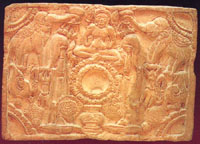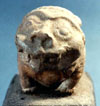


Photos by Tor
Review by Willard Van De Bogart
Click on images for larger view
The Thai Cultural Center
The key concepts for the Thai Cultural Center were expressd by Professors Emeritus Srisurang Poolthupya and M.R. Chakrarot Chitrabongs. Both had laid out in great detail what was needed for a cultural center. Chitrabongs has to his credit the design and construction of the Thai Red Cross Society Museum. However, he had to admit that every attempt to establish a Thai Cultural Centers by the Thai Government outside of Thailand had failed. In the 1990's effort was made to create a Thai Cultural Centers in N. America, Europe and Australia. Then the emphasis shifted to ASEAN countries with India now being the central focus by the Ministry of Foriegn Affairs. The administrative logistices is obviously the greatest challange where government support and individual commitment dictate the success or faliure of such a center.
With such experience being shared by these two learned presenters it was no problem to list what was felt necessary when designing and constructing a cultural center.
But then, the real serious questions had to be dealt with such as who are the clients, and what do they want? Who in fact runs the day to day operation? Who dictates the policy trends, and will they be consistent from year to year?
But, above and beyond those important and essential administrative protocols lies the rich historical and cultural linkages which have been around for two thousand years. It is not uncommon for history to be re-written to satisfy those in power. As time slowly moves into the future the greater is the distance between that first rishi who reached Thailand, and the opening of the Thai Cultural Center in New Delhi.
To be sure, having a Thai Cultural Center in India will require the support of the Thai government. However, the message that is delivered from the Thai Cultural Center has to have the unbaised scholarship shown in the content of the papers deliverd at this 2nd seminar to ensure that all future generations can see the integration that has effected both cultures. And, if syncretism is going to be a philosophical view point to best explain the cultures of these two nations then equal expression of those cultural forces needs to be kept in mind.
What I find most interesting in this effort are the complexities at representing both nations within the Thai Cultural Center in India. The center will showcase Thai culture and how India has been so instrumental in Thailand's cultural development, and at the same time affording Indians to see for the first time Thailand from an Indian perspective. This is what was meant by stating that a different perspective is needed when showcasing Thailand within India. I have no doubts that with the minds that are being assembled to make this project a success the Thai Cultural Center will be inaugurated very soon and will be a lifelong experience for the people of both nations to discover one another.
Closing Remarks by Dr. Satya Shastri and Dr. Sachidanand Sahai
Dr Shastri, renowned sanskrit scholar offered some beautiful poetic thoughts to end this two day seminar. As the din of the traffic moved incessantly outside the Royal Hotel, Dr. Shastri was telling the story of the first rishi who came to Thailand thousands of years ago as a harbinger of what was eventually to flower. An Indian became a Thai which was the foundation for the eventual spreading of Buddhism throughout SE Asia.
And now, the time has come to build The Thai Cultural Center in India following the foot steps of that first rishi of long ago to show the people in today's world the relationship between India and Thailand for future generations.
Dr. Shastri felt that the Thai Cultural Center was an oportunity for Thailand to showcase itself to India and the world. "We are not only friends, our two nations", he said, "but we are brothers who have a filial attachment".
At this point, Dr. Srisurang Poolthupya, who was the moderator for the last session, added that it was necessary for people to understand Indian art and myth so the Thai heritage can be understood.
Dr. Shastri strongly expressed that diligent work needs to be done so the Thai Cultural Center can be an agency for all. The foundation is in place and all that is necessay is to take on that first rishi's personality trait by bringing to the future generations the cultural linkages that have been nurtured for over the last two thousand years in the form of the Thai Cultural Center.
The last speaker was the eminent Dr. Sachchidanand Sahai; one of the most well known names in Southeast Asian studies. Dr. Sahai commands a great deal of presence and respect with his oratory like delivery and his authoritive tone of how ancient wisdom is fused with everyday knowledge. Dr. Sahai keeps in close touch with recent archaeological developments which can more clearly bring to light an understanding of the histories of India, Thailand, Cambodia, and Laos.
Dr. Sahai expressed whole heartedly, and with a gusto only he can command on the floor, that the Thai vision and the Indian vision need to unite. Dr. Sahai's vision is to have the Thai Cultural Center become the Diplomat of the Thai culture, and with a flare for theatrics proclaimed, "that through Buddhism and Thai cusine the world can be conqured in peace and prosperity".
Levity aside, his scholarly remarks demonstrated how the revival of Buddhism was the major contribution of Thailand. Through King Chulalongkorn's visit to India in 1872, there has been lasting effects of reform on the Thai culture. But, even before King Chulalongkorn there was King Asokha in India who in 4BCE had sent couriers to Thailand. The relationship between the two nations is indeed old.
Thailand has preserved the teachings of Buddhism for the last 800 years, said Dr. Sahai, and today Thai monasteries promote socially engaged Buddhists to take part in every facet of Thai social life. The Royal House of Thailand has preserved the sanskrit teachings, and throughout this long period of time the two nations have enjoyed a symbiotic relationship. And in ending Dr. Sahai said, "Thank you Thailand, for being the Host of Buddha".
Some Parting Thoughts
I have come away from this 2nd Seminar on Indo-Thai Historical and Cultural Linkages with a deeper appreciation for the cultural development of Thailand, which I am sure will contribute to my own research and explorations into the ancient temples of SE Asia and India.
I apologize for the extreme brevity of this review, but it serves as notice that there is currently a core of dedicated scholars and government officials who are trying to bring to fruition a Thai Cultural Center in New Delhi, India. Dr. Shastri's tree is about to blossom.
If there are errors and serious omissions or mis-quotes I welcome those corrections and additions. Please send them to my email:
vanflight@hotmail.com
It was a pleasure to meet so many dedicated and friendly scholars who have committed a life time of work to the understanding of the relationship between India and Thailand. This is an important effort for future generations and an exciting time to participate in the making of history.
Special thanks of appreciation to Miss Chana Sindhvana, 1st Secretary, Royal Thai Embassy, New Delhi, India for organizing all the activities in Bangkok, especially the traditional dancing in the evening along with the excellent Thai cuisine provided for both days.
Thank you,
Willard Van De Bogart
Related Links:
Indian Council for Cultural
Relations
Prof. Dr. Satya Vrat
Shastri
Indian Institute of Advanced Studies
- Dr. Sachidanand Sahai
South East Asian Review - Editor: Dr. Sachidanand Sahai
Royal
Thai Embassy, New Delhi, India
Sanskrit Studies Centre, Silpakorn University,
Bangkok, Thailand
References:
Sahai, S., Misra, N.(2006).Mapping Connections:
Indo-Thai Historical and Cultural Linkages.
New Delhi, India: Mantra Books.
 -
- 
Other perspectives on art and architecture: